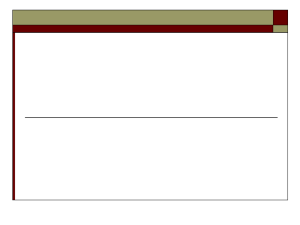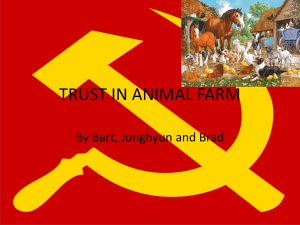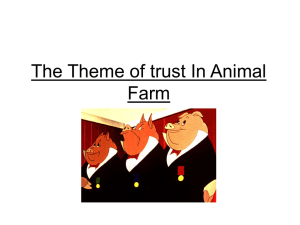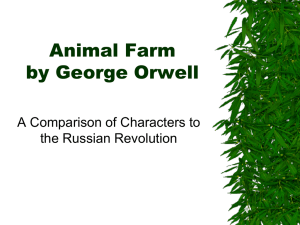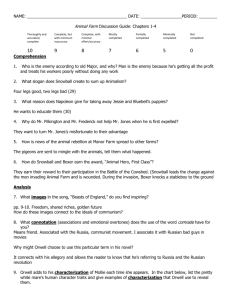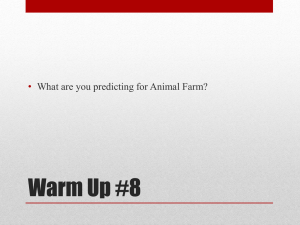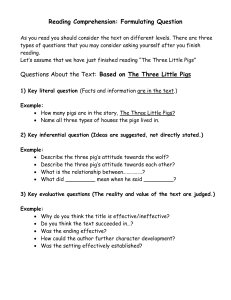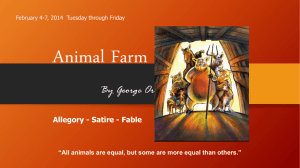Animal Farm - Chapter Analysis from Sparknotes.com Chapter 1
advertisement
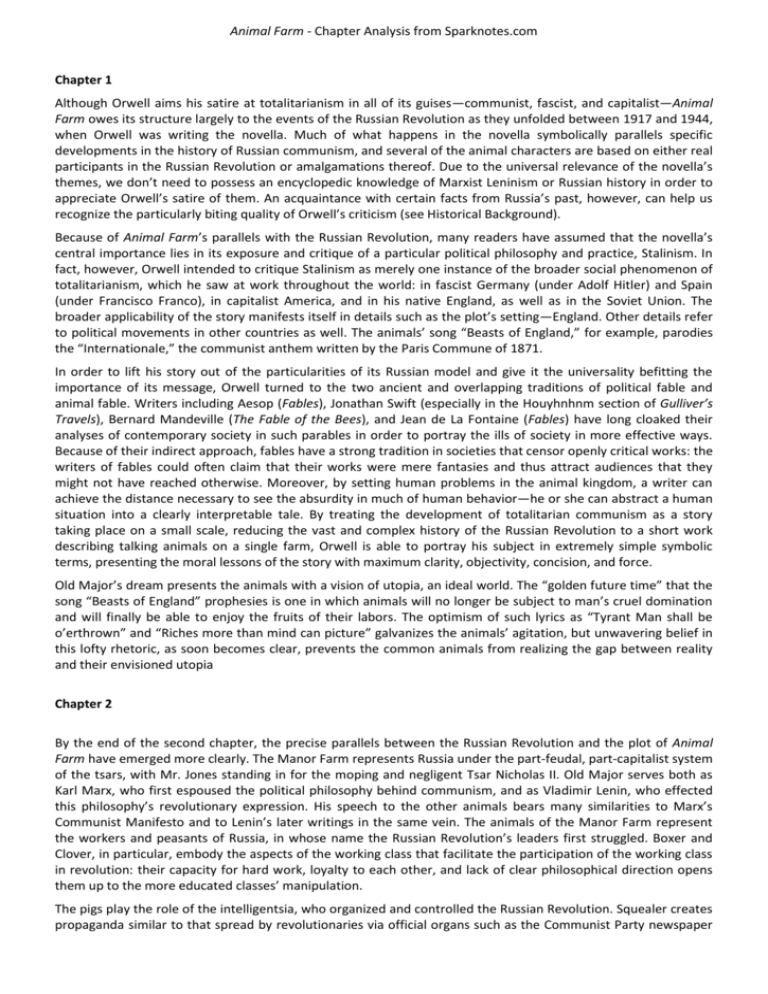
Animal Farm - Chapter Analysis from Sparknotes.com Chapter 1 Although Orwell aims his satire at totalitarianism in all of its guises—communist, fascist, and capitalist—Animal Farm owes its structure largely to the events of the Russian Revolution as they unfolded between 1917 and 1944, when Orwell was writing the novella. Much of what happens in the novella symbolically parallels specific developments in the history of Russian communism, and several of the animal characters are based on either real participants in the Russian Revolution or amalgamations thereof. Due to the universal relevance of the novella’s themes, we don’t need to possess an encyclopedic knowledge of Marxist Leninism or Russian history in order to appreciate Orwell’s satire of them. An acquaintance with certain facts from Russia’s past, however, can help us recognize the particularly biting quality of Orwell’s criticism (see Historical Background). Because of Animal Farm’s parallels with the Russian Revolution, many readers have assumed that the novella’s central importance lies in its exposure and critique of a particular political philosophy and practice, Stalinism. In fact, however, Orwell intended to critique Stalinism as merely one instance of the broader social phenomenon of totalitarianism, which he saw at work throughout the world: in fascist Germany (under Adolf Hitler) and Spain (under Francisco Franco), in capitalist America, and in his native England, as well as in the Soviet Union. The broader applicability of the story manifests itself in details such as the plot’s setting—England. Other details refer to political movements in other countries as well. The animals’ song “Beasts of England,” for example, parodies the “Internationale,” the communist anthem written by the Paris Commune of 1871. In order to lift his story out of the particularities of its Russian model and give it the universality befitting the importance of its message, Orwell turned to the two ancient and overlapping traditions of political fable and animal fable. Writers including Aesop (Fables), Jonathan Swift (especially in the Houyhnhnm section of Gulliver’s Travels), Bernard Mandeville (The Fable of the Bees), and Jean de La Fontaine (Fables) have long cloaked their analyses of contemporary society in such parables in order to portray the ills of society in more effective ways. Because of their indirect approach, fables have a strong tradition in societies that censor openly critical works: the writers of fables could often claim that their works were mere fantasies and thus attract audiences that they might not have reached otherwise. Moreover, by setting human problems in the animal kingdom, a writer can achieve the distance necessary to see the absurdity in much of human behavior—he or she can abstract a human situation into a clearly interpretable tale. By treating the development of totalitarian communism as a story taking place on a small scale, reducing the vast and complex history of the Russian Revolution to a short work describing talking animals on a single farm, Orwell is able to portray his subject in extremely simple symbolic terms, presenting the moral lessons of the story with maximum clarity, objectivity, concision, and force. Old Major’s dream presents the animals with a vision of utopia, an ideal world. The “golden future time” that the song “Beasts of England” prophesies is one in which animals will no longer be subject to man’s cruel domination and will finally be able to enjoy the fruits of their labors. The optimism of such lyrics as “Tyrant Man shall be o’erthrown” and “Riches more than mind can picture” galvanizes the animals’ agitation, but unwavering belief in this lofty rhetoric, as soon becomes clear, prevents the common animals from realizing the gap between reality and their envisioned utopia Chapter 2 By the end of the second chapter, the precise parallels between the Russian Revolution and the plot of Animal Farm have emerged more clearly. The Manor Farm represents Russia under the part-feudal, part-capitalist system of the tsars, with Mr. Jones standing in for the moping and negligent Tsar Nicholas II. Old Major serves both as Karl Marx, who first espoused the political philosophy behind communism, and as Vladimir Lenin, who effected this philosophy’s revolutionary expression. His speech to the other animals bears many similarities to Marx’s Communist Manifesto and to Lenin’s later writings in the same vein. The animals of the Manor Farm represent the workers and peasants of Russia, in whose name the Russian Revolution’s leaders first struggled. Boxer and Clover, in particular, embody the aspects of the working class that facilitate the participation of the working class in revolution: their capacity for hard work, loyalty to each other, and lack of clear philosophical direction opens them up to the more educated classes’ manipulation. The pigs play the role of the intelligentsia, who organized and controlled the Russian Revolution. Squealer creates propaganda similar to that spread by revolutionaries via official organs such as the Communist Party newspaper Animal Farm - Chapter Analysis from Sparknotes.com Pravda. Moses embodies the Russian Orthodox Church, weakening the peasants’ sense of revolutionary outrage by promising a utopia in the afterlife; the beer-soaked bread that Mr. Jones feeds him represents the bribes with which the Romanov dynasty (in which Nicholas II was the last tsar) manipulated the church elders. Mollie represents the self-centered bourgeoisie: she devotes herself to the most likely suppliers of luxuries and comfort. The animals’ original vision for their society stems from noble ideals. Orwell was a socialist himself and supported the creation of a government in which moral dignity and social equality would take precedence over selfish individual interests. The Russian revolutionaries began with such ideals as well; Marx certainly touted notions like these in his writings. On Animal Farm, however, as was the case in the Russian Revolution, power is quickly consolidated in the hands of those who devise, maintain, and participate in the running of society—the intelligentsia. This class of Russians and their allies quickly turned the Communist Party toward totalitarianism, an event mirrored in Animal Farm by the gradual assumption of power by the pigs. After Lenin’s seizure of power, Communist Party leaders began jockeying for position and power, each hoping to seize control after Lenin’s death. Snowball and Napoleon, whose power struggle develops fully in the next chapters, are based on two real Communist Party leaders: Snowball shares traits with the fiery, intelligent leader Leon Trotsky, while the lurking, subversive Napoleon has much in common with the later dictator Joseph Stalin. Orwell’s descriptions in this chapter of the pre-Rebellion misery of the farm animals serve his critique of social inequality and the mistreatment of workers. They also make a pointed statement about humans’ abuse of animals. Indeed, the same impulse that led Orwell to sympathize with poor and oppressed human beings made him lament the cruelty that many human beings show toward other species. He got the idea for Animal Farm while watching a young boy whipping a cart-horse. His pity for the exploited horse reminded him of his sympathy for the exploited working class. Orwell creates a particularly moving scene in portraying the animals’ efforts to obliterate the painful reminders of their maltreatment: this episode stands out from much of the rest of the novella in its richness of detail. In the attention to “the bits, the nose-rings, the dog-chains, the cruel knives,” and a whole host of other instruments of physical discipline, we see Orwell’s profound empathy with the lowest of the low, as well as his intense hatred for physical suffering and its destruction of dignity Chapter 3 Boxer’s motto, in response to the increased labors on Animal Farm, of “I will work harder” is an exact echo of the immigrant Jurgis Rudkus’s motto, in response to financial problems, in Upton Sinclair’s The Jungle. Whereas Boxer exerts himself for the common good, as his socialist society dictates he must, Jurgis exerts himself for his own good, as his capitalist society dictates he must. Both possess a blind faith that the key to happiness lies in conforming to the existing political-economic system. Committed to socialism, Orwell would almost certainly have read The Jungle, which, published in its entirety in 1906, was a searing indictment of capitalism and galvanized the American socialist movement. His appropriation of Jurgis’s motto for Boxer implicitly links the oppression of capitalism with that of totalitarian communism, as, in each case, the state wholly ignores the suffering of those who strive to be virtuous and work within the system. The varying degrees of literacy among the animals suggest the necessity of sharing information in order for freedom to be maintained. To the pigs’ credit, they do try to teach the other animals the basics of reading and writing, but the other animals prove unable or unwilling. The result is a dangerous imbalance in knowledge, as the pigs become the sole guardians and interpreters of Animal Farm’s guiding principles. The discrepancy among the animals’ capacity for abstract thought leads the pigs to condense the Seven Commandments into one supreme slogan: “Four legs good, two legs bad.” The birds’ objection to the slogan points immediately to the phrase’s excessive simplicity. Whereas the Seven Commandments that the pigs formulate are a detailed mix of antihuman directives (“No animal shall wear clothes”), moral value judgments (“No animal shall kill another animal”), and utopian ideals (“All animals are equal”), the new, reductive slogan contains none of these elements; it merely establishes a bold dichotomy that masks the pigs’ treachery. The motto has undergone such generalization that it has become propaganda, a rallying cry that will keep the common animals focused on the pigs’ rhetoric so that they will ignore their own unhappiness. Animal Farm - Chapter Analysis from Sparknotes.com In its simplicity, this new, brief slogan is all too easy to understand and becomes ingrained in even the most dullwitted of minds, minds that cannot think critically about how the slogan, while seeming to galvanize the animals’ crusade for freedom, actually enables the pigs to institute their own oppressive regime. The animals themselves may be partially responsible for this power imbalance: on the whole, they show little true initiative to learn—the dogs have no interest in reading anything but the Seven Commandments, and Benjamin decides not to put his ample reading skills to use. Though the birds don’t understand Snowball’s long-winded explanation of why wings count as legs, they accept it nonetheless, trusting in their leader. It would be unfair, however, to fault the common animals for their failure to realize that the pigs mean to oppress them. Their fervor in singing “Beasts of England” and willingness to follow the pigs’ instructions demonstrate their virtuous desire to make life better for one another. The common animals cannot be blamed for their lesser intelligence. The pigs, however, mix their intelligence with ruthless guile and take advantage of the other animals’ apathy. Their machinations are reprehensible. Squealer figures crucially in the novel, as his proficiency in spreading lie-filled propaganda allows the pigs to conceal their acts of greed beneath a veneer of common good. His statements and behaviors exemplify the linguistic and psychological methods that the pigs use to control the other animals while convincing them that this strict regime is essential if the animals want to avoid becoming subject to human cruelty again. In the opinion of Orwell, the socialist goals of the Russian Revolution quickly became meaningless rhetorical tools used by the communists to control the people: the intelligentsia began to interpret the “good of the state” to mean the good of itself as a class, and anyone who opposed it was branded an “enemy of the people.” On Animal Farm, Squealer makes himself useful to the other pigs by pretending to side with the oppressed animals and falsely aligning the common good with the good of the pigs Chapter 4 Boxer’s motto, in response to the increased labors on Animal Farm, of “I will work harder” is an exact echo of the immigrant Jurgis Rudkus’s motto, in response to financial problems, in Upton Sinclair’s The Jungle. Whereas Boxer exerts himself for the common good, as his socialist society dictates he must, Jurgis exerts himself for his own good, as his capitalist society dictates he must. Both possess a blind faith that the key to happiness lies in conforming to the existing political-economic system. Committed to socialism, Orwell would almost certainly have read The Jungle, which, published in its entirety in 1906, was a searing indictment of capitalism and galvanized the American socialist movement. His appropriation of Jurgis’s motto for Boxer implicitly links the oppression of capitalism with that of totalitarian communism, as, in each case, the state wholly ignores the suffering of those who strive to be virtuous and work within the system. The varying degrees of literacy among the animals suggest the necessity of sharing information in order for freedom to be maintained. To the pigs’ credit, they do try to teach the other animals the basics of reading and writing, but the other animals prove unable or unwilling. The result is a dangerous imbalance in knowledge, as the pigs become the sole guardians and interpreters of Animal Farm’s guiding principles. The discrepancy among the animals’ capacity for abstract thought leads the pigs to condense the Seven Commandments into one supreme slogan: “Four legs good, two legs bad.” The birds’ objection to the slogan points immediately to the phrase’s excessive simplicity. Whereas the Seven Commandments that the pigs formulate are a detailed mix of antihuman directives (“No animal shall wear clothes”), moral value judgments (“No animal shall kill another animal”), and utopian ideals (“All animals are equal”), the new, reductive slogan contains none of these elements; it merely establishes a bold dichotomy that masks the pigs’ treachery. The motto has undergone such generalization that it has become propaganda, a rallying cry that will keep the common animals focused on the pigs’ rhetoric so that they will ignore their own unhappiness. In its simplicity, this new, brief slogan is all too easy to understand and becomes ingrained in even the most dullwitted of minds, minds that cannot think critically about how the slogan, while seeming to galvanize the animals’ crusade for freedom, actually enables the pigs to institute their own oppressive regime. The animals themselves may be partially responsible for this power imbalance: on the whole, they show little true initiative to learn—the dogs have no interest in reading anything but the Seven Commandments, and Benjamin decides not to put his Animal Farm - Chapter Analysis from Sparknotes.com ample reading skills to use. Though the birds don’t understand Snowball’s long-winded explanation of why wings count as legs, they accept it nonetheless, trusting in their leader. It would be unfair, however, to fault the common animals for their failure to realize that the pigs mean to oppress them. Their fervor in singing “Beasts of England” and willingness to follow the pigs’ instructions demonstrate their virtuous desire to make life better for one another. The common animals cannot be blamed for their lesser intelligence. The pigs, however, mix their intelligence with ruthless guile and take advantage of the other animals’ apathy. Their machinations are reprehensible. Squealer figures crucially in the novel, as his proficiency in spreading lie-filled propaganda allows the pigs to conceal their acts of greed beneath a veneer of common good. His statements and behaviors exemplify the linguistic and psychological methods that the pigs use to control the other animals while convincing them that this strict regime is essential if the animals want to avoid becoming subject to human cruelty again. In the opinion of Orwell, the socialist goals of the Russian Revolution quickly became meaningless rhetorical tools used by the communists to control the people: the intelligentsia began to interpret the “good of the state” to mean the good of itself as a class, and anyone who opposed it was branded an “enemy of the people.” On Animal Farm, Squealer makes himself useful to the other pigs by pretending to side with the oppressed animals and falsely aligning the common good with the good of the pigs Chapter 5 This chapter illuminates Napoleon’s corrupt and power-hungry motivations. He openly and unabashedly seizes power for himself, banishes Snowball with no justification, and shows a bald-faced willingness to rewrite history in order to further his own ends. Similarly, Stalin forced Trotsky from Russia and seized control of the country after Lenin’s death. Orwell’s experience in a persecuted Trotskyist political group in the late 1930s during the Spanish Civil War may have contributed to his comparatively positive portrayal of Snowball. Trotsky was eventually murdered in Mexico, but Stalin continued to evoke him as a phantom threat, the symbol of all enemy forces, when he began his bloody purges of the 1930s. These purges appear in allegorized form in the next chapters of Animal Farm. Lenin once famously remarked that communism was merely socialism plus the electrification of the countryside, a comment that reveals the importance of technological modernization to leaders in the young Soviet Union. The centrality of the electrification projects in the Soviet Union inspired the inclusion of the windmill in Animal Farm. Communist leaders considered such programs absolutely essential for their new nation, citing their need to upgrade an infrastructure neglected by the tsars and keep up with the relatively advanced and increasingly hostile West. Russia devoted a great deal of brain- and manpower to putting these programs in place. As suggested by the plot of Animal Farm, Stalin initially balked at the idea of a national emphasis on modern technology, only to embrace such plans wholeheartedly once he had secured his position as dictator. This chapter lies near the middle of Orwell’s narrative and, in many ways, represents the climax of the tension that has been building from the beginning. Since the animals’ initial victory over Mr. Jones, we have suspected the motives of the pig intelligentsia and Napoleon in particular: ever since the revelation in Chapter III that they have been stealing apples and milk for themselves, the pigs have appeared more interested in grabbing resources and power than in furthering the good of the farm. Now, when Napoleon sets his dogs on Snowball, he proves that his socialist rhetoric about the common good is quite empty. The specifics of Napoleon’s takeover bespeak a long period of careful plotting: Napoleon has been deliberating his seizure of power ever since he first took control of the dogs’ training, in Chapter III. Thus, the banishment of Snowball constitutes the culmination of long-held resentments and aspirations and climactically justifies our feelings of uneasiness about Napoleon. In his use of the dogs, Napoleon has monopolized the farm’s sources of defense and protection—the dogs could have guarded the farm and warded off predators—in order to create his own private secret police. The pigs claim a parallel monopoly on logic. Squealer linguistically transforms Napoleon’s self-serving act of banishing Snowball into a supreme example of self-sacrifice and manages to convince the animals that no contradiction underlies the leader’s abrupt about-face on the issue of the windmill. Each of Napoleon’s acts of physical violence thus gains acceptance and legitimacy via a corresponding exercise of verbal violence. Political subversion depends on a subversion of logic and language. The connection between these two forms of violence and subversion remained Animal Farm - Chapter Analysis from Sparknotes.com a central concern for Orwell throughout his life, and he examines it both in later chapters of Animal Farm and in his last major novel, 1984. Chapter 6 Part of the greater importance of the novella owes to its treatment of Animal Farm not as an isolated entity but as part of a network of farms—an analogue to the international political arena. Orwell thus comments on Soviet Russia and the global circumstances in which it arose. But the tactics that we see the pigs utilizing here—the overworking of the laboring class, the justification of luxuries indulged in by the ruling class, the spreading of propaganda to cover up government failure or ineffectiveness—evoke strategies implemented not only by communist Russia but also by governments throughout the world needing to oppress their people in order to consolidate their power. Napoleon makes the outrageous claim that Snowball was responsible for the windmill’s destruction in order to shift the blame from his own shoulders. Governments throughout the world have long bolstered their standing among the populace by alluding to the horrors of an invisible, conspiratorial enemy, compared to which their own misdeeds or deficiencies seem acceptable. Stalin used this tactic in Russia by evoking a demonized notion of Trotsky, but the strategy has enjoyed popularity among many other administrations. Indeed, during much of the twentieth century, it was the communists who served as a convenient demon to governments in the West: both German and American governments used the threat of communism to excuse or cover up their own aggressive behaviors. More broadly, the windmill represents the pigs’ continued manipulation of the common animals. They not only force the animals to break their backs to construct the windmill by threatening to withhold food; they also use the windmill’s collapse—the blame for which, though it is caused by a storm, rests with the pigs for not having the foresight to build thicker walls—to play on the animals’ general fear of being re-enslaved. By deflecting the blame from themselves onto Snowball, they prevent the common animals from realizing how greatly the pigs are exploiting them and harness the animals’ energy toward defeating this purported enemy. In this chapter, Orwell also comments on the cyclical nature of tyranny. As the pigs gain power, they become increasingly corrupt. Soon they embody the very iniquity that Animal Farm was created to overturn. As many political observers have noted, Stalin and his officials quickly entered into the decadent lifestyles that had characterized the tsars. The communists themselves had pointed to these lifestyles in maligning the old administration. Orwell parodies this phenomenon by sketching his pigs increasingly along the lines of very grotesque human beings. Throughout the novel, the pigs increasingly resemble humans, eventually flouting altogether Old Major’s strictures against adopting human characteristics. With the pigs’ move into the farmhouse to sleep in the farmer’s beds, Orwell remarks upon the way that supreme power corrupts all who possess it, transforming all dictators into ruthless, self-serving, and power-hungry entities that can subsist only by oppressing others Chapter 7 The humans react with relief when the windmill topples because its failure seems to justify their contempt for the animals and their belief in their own superiority. Similarly, Soviet Russia struggled against a largely justified reputation for industrial incompetence, famine, and poor management. Stalin’s vaunted Five-Year Plans for agriculture resulted in the starvation of millions of people, and industrial production lagged far behind the capitalist West. But the Soviets were determined to mask their problems and keep them from the eyes of the rest of the world. Correspondingly, the pigs of Animal Farm devise elaborate schemes to keep the human farmers from learning about their difficulties. The windmill becomes an important measure of the farm’s competence, and its collapse deals a major blow to the pigs’ prestige as equals in the community of farms—just as Soviet Russia’s industrial setbacks threatened its position as an equal to the leading nations of the world and as a viable model of communist revolution. Chapter VII joins Chapter VI in focusing primarily on the violent tactics employed by oppressive governments— again explored through the behavior of the pigs—to maintain the docility and obedience of the populace even as Animal Farm - Chapter Analysis from Sparknotes.com their economic and political systems falter and grow corrupt. In Soviet Russia, these tactics led to a massive class division in a supposedly egalitarian society. Orwell suggests that as long as a leadership claims a monopoly on logic, it will be able to justify its monopoly on resources, while the common people suffer and grow hungry. Similarly, as life on Animal Farm grows leaner and leaner for most of the animals, the pigs live in increasing luxury. Napoleon’s transformation of the exiled Snowball into a despicable enemy to all who care about the good of Animal Farm mirrors Stalin’s abuse of the exiled Trotsky. Those animals who show even a glimmering of disapproval toward Napoleon, such as the hens who oppose the selling of their eggs, meet a swift death. Similarly, after forcing Trotsky’s exile from Russia, Stalin continued to claim the existence of Trotskyist plots throughout Soviet society. During the 1930s, he staged a number of infamous “purges,” show trials during which Stalin and his allies essentially forced government members and citizens to “confess” their complicity with Trotskyist or other anti-Stalinist conspiracies. In many cases, the purge victims would admit to activities in which they had never engaged, simply to put a stop to their torture. But after confessing, the alleged conspirators were executed as “enemies of the people.” Stalin used his purges to eliminate any dissident elements in his government, provide his people with a common enemy to despise, and keep both the populace and his staff in a state of fear for their own safety, making them far less likely to disobey orders or challenge his rule in any way. Just as the pigs rewrite history, they manipulate statistics in their favor, claiming that every important aspect of life on the farm has improved statistically since the Rebellion: animals live longer, eat more, have more offspring, work fewer hours, and so forth. In this way, the pigs produce a false vision of reality. Then, by ensuring that this reality is the only one to which the other animals have access and by establishing an effective death penalty for any animal who questions it, they render their dictatorship indestructible. Fear makes the animals inclined to believe the pigs’ propaganda, and by allowing themselves to believe in the comforting lies, the animals find what may be their only safe haven from violence and terror Chapter 8 By this point, Napoleon and Squealer have so systematically perverted the truth that the animals cannot recognize their leaders’ duplicity even when they witness it directly. Karl Marx had theorized the need for a “dictatorship of the proletariat” during the early years of his prescribed revolution, under which democratic freedoms would take second place to stamping out resistance in the bourgeoisie. In Soviet Russia, Stalin and his colleagues used Marx’s theories as a justification for their increasingly violent and tyrannical actions. Moreover, they used this one Marxist principle to justify their neglect of the other principles. The Stalinist government, for example, quickly altered the noble ideals of equal work and equal compensation in order to favor the politically and militarily powerful. Even when the machinations of the government became clear to everyone in Russia—in the novella we see such a moment when the animals catch Squealer literally rewriting the law on the side of the barn—no significant popular revolt among the working classes ever occurred. Similarly, the animals show no signs of rebellion. Minimus’s poem provides compelling evidence for the animals’ largely uncritical attitude toward the regime that oppresses it. Though the poem is outrageously inflated and tastelessly sentimental, the animals don’t question it; instead, they allow it to speak for them. With the poem, Orwell creates a passage of great irony and a wonderful satire of patriotic rhetoric. Much of the poem’s humor arises from its combination of high and low language, exposing the ridiculousness of what it intends to celebrate. Thus, the poem praises Napoleon as “Fountain of happiness!” but also “Lord of the swill-bucket!” While it glorifies life under Napoleon, it emphasizes its simple triviality: “All that [his] creatures love” amounts to a “full belly” and “clean straw.” This stylistic use of contrast helps render the poem’s tone of utter devotion (“Oh how my soul is on / Fire”) a mockery of itself. At the same time, of course, the poem parodies actual anthems and patriotic odes. Orwell aims to expose the inanity of such patriotic sentiment, and also its emptiness, if not its misdirection. He suggests that such rhetoric fails to examine the essence of that which it praises. The description of Napoleon’s dealings with his neighbors, Mr. Pilkington and Mr. Frederick, elaborately parodies Stalin’s diplomatic tap dance with Germany and the Allies at the outset of World War II. Stalin, faced with an unpleasant choice between the capitalist Allies and the fascist Germans and reluctant to enter into another large war, stalled by alternately siding with one country and then the other, using propaganda to drag the populace along with his changing allegiances. At the last minute, and quite unexpectedly, he signed the Non-Aggression Animal Farm - Chapter Analysis from Sparknotes.com Pact (an agreement not to wage war on each other) with the German leader Adolf Hitler, much as Napoleon makes the surprise move of selling the timber to Mr. Frederick. Hitler almost immediately went back on his word—as is evoked by Mr. Frederick’s forged banknotes—and invaded Russia’s western frontier, eventually killing over twenty-five million Russians and demolishing much of the infrastructure that the Soviets had built since the Russian Revolution. In his depiction of the animals’ response to Mr. Frederick’s gratuitous destruction of the great windmill, Orwell aptly conveys the tremendous sense of betrayal and feelings of anger that Russians felt toward Germany during and after World War II. The pigs, echoing another tactic of the victorious governments after World War II, use the heroism of individuals from the lower classes to reinforce the patriotism of the demoralized survivors. Orwell crafts particularly keen descriptions of the patriotic celebrations and rituals after the animals’ war with Mr. Frederick’s men. He subtly implies that while such ceremonies have the apparent function of bestowing the glory of the state upon the individual, they truly serve the opposite goal: to transfer the nobility of individual sacrifices onto the state. There are several notable parallels between Animal Farm and Orwell’s final novel, 1984. One can argue that Animal Farm was even a sort of study for 1984, which applies many of Animal Farm’s themes and ideas to human society, rendering the horror of totalitarian government all the more real. One of the principal ideas that each work addresses is the ability of those in power to control and alter both attitudes and history, especially by subverting language. Just as Squealer offers a host of statistics to show that Animal Farm is in better shape than ever, despite the fact that the animals are hungry and cold, so too does the Ministry of Plenty, in 1984, crank out misleading reports about how greatly production has increased; indeed, the ministry reduces rations but convinces people that it is actually increasing them. Similarly, Animal Farm’s ever-alternating alliance with Mr. Frederick and Mr. Pilkington and the leaders’ claim that the farm has always remained committed to the same farmer reaches the apex of absurdity in 1984. In the middle of a speech during Hate Week, the masses mindlessly accept the speaker’s assertion that their country, Oceania, which has indeed been at war with Eurasia, is actually not at war and never has been at war with Eurasia. He says the country is and always has been at war with Eastasia. The masses, carrying explicit anti-Eurasia signs, become embarrassed about their apparent mistake. Chapter 9 As members of the revolutionary era in Russia began to expect to receive some compensation for all of the terrible sacrifices they had made in the revolution and in the war with Germany, they became painfully aware of the full extent of their betrayal at the hands of the Stalinist leadership. The quality of life for the average citizen continued to decline, even as the ruling class grew ever larger and consumed ever more luxuries. Orwell uses Boxer’s death as a searing indictment of such totalitarian rule, and his death points sadly and bitterly to the downfall of Animal Farm. The great horse seems to have no bad qualities apart from his limited intellect, but, in the end, he falls victim to his own virtues—loyalty and the willingness to work. Thus, Boxer’s great mistake lies in his conflation of the ideal of Animal Farm with the character of Napoleon: never thinking for himself about how the society should best realize its founding ideals, Boxer simply follows Napoleon’s orders blindly, naïvely assuming that the pigs have the farm’s best interest at heart. It is sadly ironic that the system that he so loyally serves ultimately betrays him: he works for the good of all but is sold for the good of the few. The pig leadership’s treachery and hypocrisy becomes even more apparent in the specific manner of Boxer’s death: by selling Boxer for profit, the pigs reenact the very same cruelties against which the Rebellion first fights—the valuing of animals for their material worth rather than their dignity as living creatures. When a new crate of whisky arrives for the pigs, we can reasonably infer that the money for it has come from the sale of Boxer. Moreover, the intensely pathetic nature of Boxer’s fate—death in a glue factory—contrasts greatly with his noble character, and the contrast contributes to the dramatic effect of Boxer’s death, increasing the power of Orwell’s critique. Boxer’s life and death provide a microcosm for Orwell’s conception of the ways in which the Russian communist power apparatus treated the working class that it purported to serve: Orwell suggests that the administration exhausted the resources of the workers for its own benefit and then mercilessly discarded them. In order to defuse potential outrage at his blatant cruelty, Napoleon brings Moses back and allows him to tell his tales of Sugarcandy Mountain, much as Stalin made a place for the once-taboo Russian Orthodox Church after Animal Farm - Chapter Analysis from Sparknotes.com World War II. Moses’s return signals the full return of oppression to the farm. While the pigs object early on to Moses’s teachings because they undermine the animals’ will to rebel, they now embrace the teachings for precisely the same reason. Napoleon further hopes to appease his populace by means of his Spontaneous Demonstrations, which force the animals to go through the motions of loyalty, despite what they may actually feel. The name of the new ritual bears particular irony: these gatherings are anything but spontaneous and demonstrate very little beyond a fearful conformity. The irony of the title indicates the overriding hollowness of the event. Because the elite class controls the dissemination of information on Animal Farm, it is able to hide the terrible truth of its exploitation of the other animals. Fallible individual memories of Snowball’s bravery and Napoleon’s cowardice at the Battle of the Cowshed prove no match for the collective, officially sponsored memory that Squealer constructs, which paints a picture indicating completely the reverse. With no historical, political, or military resources at their command, the common animals have no choice but to go along with the charade Chapter 10 “If you have your lower animals to contend with,” he said, “we have our lower classes The last chapter of Animal Farm brings the novel to its logical, unavoidable, yet chilling conclusion. The pigs wholly consolidate their power and their totalitarian, communist dictatorship completely overwhelms the democratic-socialist ideal of Animal Farm. Napoleon and the other pigs have become identical to the human farmers, just as Stalin and the Russian communists eventually became indistinguishable from the aristocrats whom they had replaced and the Western capitalists whom they had denounced. The significance of Napoleon’s name is now entirely clear: the historical Napoleon, who ruled France in the early nineteenth century and conquered much of Europe before being defeated at the Battle of Waterloo in 1814, originally appeared to be a great liberator, overthrowing Europe’s kings and monarchs and bringing freedom to its people. But he eventually crowned himself emperor of France, shattering the dreams of European liberalism. Rather than destroying the aristocracy, Napoleon simply remade it around himself. Similarly, the pig Napoleon figures as the champion of Animalism early on. Now, however, he protests to the humans that he wants nothing more than to be one of them—that is, an oppressor. Throughout the novella, Orwell has told his fable from the animals’ point of view. In this chapter, we see clearly the dramatic power achieved by this narrative strategy. The animals remain naïvely hopeful up until the very end. Although they realize that the republic foretold by Old Major has yet to come to fruition, they stalwartly insist that it will come “[s]ome day.” These assertions charge the final events of the story with an intense irony. For although Orwell has used foreshadowing and subtle hints to make us more suspicious than the animals of the pigs’ motives, these statements of ingenuous faith in Animal Farm on the part of the common animals occur just before the final scene. This gap between the animals’ optimism and the harsh reality of the pigs’ totalitarian rule creates a sense of dramatic contrast. Although the descent into tyranny has been gradual, Orwell provides us with a restatement of the original ideals only moments before the full revelation of their betrayal. Orwell uses emphatic one-line paragraphs to heighten the terror of this betrayal: the succinct conveyance of “It was a pig walking on his hind legs” and “He carried a whip in his trotter” drops this stunning information on us without warning, shocking us as much as it does the animals. Moreover, Orwell’s decision to tell the story from the animals’ point of view renders his final tableau all the more terrible. The picture of the pigs and farmers, indistinguishable from one another, playing cards together is disturbing enough by itself. Orwell, however, enables us to view this scene from the animals’ perspective—from the outside looking in. By framing the scene in this way, Orwell points to the animals’ total loss of power and entitlement: Animal Farm has not created a society of equals but has simply established a new class of oppressors to dominate the same class of oppressed—a division embodied, as at the opening of the novella, by the farmhouse wall. The final distillation of the Seven Commandments that appears on the barn—“all animals are equal, but some are more equal than others”—stands as the last great example of how those in power manipulate language as an instrument of control. At the beginning of the novella, the idea of “more equal” would not only have seemed contrary to the egalitarian socialist spirit of Animal Farm, it would have seemed logically impossible. But after Animal Farm - Chapter Analysis from Sparknotes.com years of violence, hunger, dishonesty, and fear, the spirit of Animal Farm seems lost to a distant past. The concept of inherent equality has given way to notions of material entitlement: Animal Farm as an institution no longer values dignity and social justice; power alone renders a creature worthy of rights. By claiming to be “more equal”—an inherently nonsensical concept—than the other animals, the pigs have distorted the original ideals of the farm beyond recognition and have literally stepped into the shoes of their former tyrannical masters.
